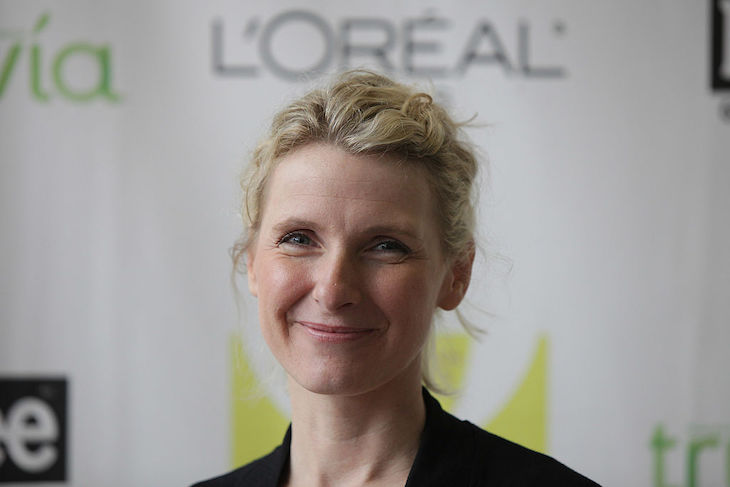At the end of the 1920s, Erich Maria Remarque’s novel Im Westen nichts Neues appeared in English as All Quiet On The Western Front. For its readership in this country a devastating, grinding war against an enemy they had been encouraged to think of as bestial and inhuman huns was in recent memory. Here was a book that told how the war had been for those huns in the opposing trenches; that showed it wasn’t all that different for them at all. Nobody, as far as I know, even as our cities were filled with broken, disfigured, disabled and traumatised veterans, attempted to suppress Remarque’s book on the grounds that it encouraged sympathy for Germans. In fact, the only people who tried to suppress it were the Nazis.
Compare the reaction, now, to Elizabeth Gilbert’s new novel The Snow Forest. No sooner had its publication been announced than it was bombarded on Goodreads with one-star reviews (why Goodreads allows people to post reviews of books they cannot possibly have read is an issue for another day; eejits gonna eejit).
Ms Gilbert’s new book – which, like everyone else, I haven’t read – commits the sin of being set in Russia. It’s not even set in contemporary Russia, but in mid-twentieth-century Siberia. Knowing what we know of publication schedules, she will have started, and quite possibly finished, writing it before Russian troops set foot on Ukrainian soil. It can be assumed to have literally no bearing on the Russia of Vladimir Putin or its war of aggression in Ukraine. Nevertheless, these one-star reviews see her novel as giving aid and succour to the enemy: ‘maybe stop romanticising Russia’; ‘Do you write about Russia, romanticise this country while it commits genocide and ecocide in Ukraine?’; ‘Attacking a neighbouring country and killing civilians and hundreds of children is obviously a good indicator for you to write something…’
The result is that the author has attempted to appease her critics by indefinitely withdrawing her new novel from publication, saying: ‘I do not want to add any harm to a group of people who have already experienced and who are all continuing to experience grievous and extreme harm.’ I expect she meant to #bekind, but it seems to me her decision is deeply to be regretted. Gosh, what a missed opportunity to tell a pack of clueless would-be censors to jog on.
There is a school of thought that the campaign against Ms Gilbert’s unpublished work was ‘well-meaning’ but ‘wrong-headed’; that it reflects an ‘understandable’ sense of hurt among (or on behalf of) Ukrainians and their suffering. That school of thought is timid, equivocating rubbish. These people are idiots, and malign, self-righteous, solipsistic idiots at that. They shouldn’t be left unattended with washable crayons, let alone be writing book reviews in a public forum.
They are, first of all, thoroughgoing racists, no two ways about it. The bones of their thinking , if you could call it that, is that Russia as a nation, Russians as a people, and the cultural history of Russia itself bears moral responsibility for the invasion of Ukraine. For those who will object, by the way, that it can’t be racist because Russian isn’t a race but a nationality, I refer you to the same answer one would make to the old ‘but Judaism/Islam is a religion not a race’ brigade: nor, in any scientific sense, are ‘black’ or ‘Pakistani’ or ‘Chinese’ a race. The moral failure we call racism is about imputing an ethical characteristic to a whole ethnic/cultural category of people.
They are also profound philistines. If art does not enlarge men’s sympathies, said George Eliot, it does nothing morally. Here is a campaign against a work of art founded, expressly, on the fear that it might enlarge men’s sympathies; that it might allow readers to see Russians as more than an undifferentiated mass of contemptible neo-Nazis. You don’t do Ukraine any favours, incidentally, by pushing this line. It’s categorical, dehumanising national/racial propaganda that is helping drive this conflict in Russian public opinion and returning tit for tat pays that noxious way of thinking the highest imaginable compliment.
Fiction helps make possible the state of mind, when the guns fall silent, that allows you to rebuild
Finally, they are at once hubristic and parochially-minded to an extend that causes the jaw to drop and the eyes to boing out like deely-boppers. Hubristic because they seem to think it’s possible to cancel Russia itself: to make its vast geography, its long history, its countless millions of inhabitants living and dead, forbidden territory for the imagination. Parochial because that hubris betrays that they can’t quite conceive of Russia being a real place like, say, America; that it can contain the sort of multitudes that fiction is so good at capturing. By which, I mean, try to imagine how absurd it would have been for someone to call for novels set in the USA to cease being written in protest at Henry Kissinger’s bombing of Cambodia.
The assumption that fiction must be propaganda, or should be propaganda, is toxic to fiction and the moral and imaginative work it does. When propaganda is telling you that the enemy is an orc or a troll or a monster, fiction can remind you that he is not. Propaganda is what gives you a forever war and a four-minute hate. Fiction helps make possible the state of mind, when the guns fall silent, that allows you to rebuild. Remarque and his readers knew that. I suspect so does Elizabeth Gilbert. She should have held the line.
Got something to add? Join the discussion and comment below.
Get 10 issues for just $10
Subscribe to The Spectator Australia today for the next 10 magazine issues, plus full online access, for just $10.





















Comments
Don't miss out
Join the conversation with other Spectator Australia readers. Subscribe to leave a comment.
SUBSCRIBEAlready a subscriber? Log in